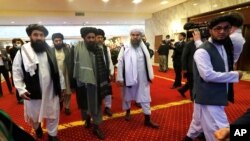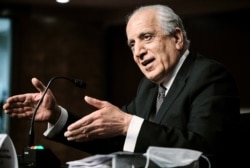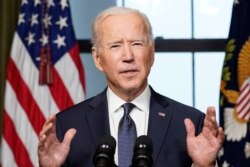The United States appears upbeat about the resumption of stalled peace talks between warring parties in Afghanistan, even as fighting escalates amid the withdrawal of U.S. and NATO troops from the country.
A senior U.S. official said Tuesday during a background briefing in Kabul that Washington's diplomatic efforts are continuing "to try to get the peace process" between the Afghan government and the Taliban back on track.
"We're not giving up on the peace process," said the State Department diplomat, who requested anonymity. "We're trying to bring all pressures to bear on the Taliban to come to the table, and to come seriously. We hope and expect that that happens."
The official spoke a day after Zalmay Khalilzad, U.S. special envoy for Afghan reconciliation, visited Kabul, where he shared the latest details of his peace offensive with the Afghan leadership. Khalilzad traveled to the Afghan capital from Doha, Qatar, where he had held talks with Taliban negotiators based there.
Renewed fighting
The peace diplomacy comes as the Taliban have unleashed fresh battlefield attacks across several Afghan provinces in response to the U.S. missing a May 1 troop withdrawal deadline in line with an agreement Washington negotiated with the insurgents a year ago.
The Taliban offensive has overrun territory in some areas, drawing a strong response from Afghan security forces, with both sides claiming to have inflicted heavy casualties on the other.
The fighting has been relatively more intense and widespread in southern Helmand province, the country's largest province and a major illicit opium-producing region. The Taliban control or contest most of Helmand, while the provincial capital, Lashkar Gah, is largely held by Kabul.
An Afghan military statement said Tuesday that its ground strikes and airstrikes in Helmand have killed more than 100 Taliban "terrorists" in the last 24 hours, along with at least 22 al-Qaida militants.
A Taliban spokesman swiftly rejected the claims as propaganda and denied the presence of foreign fighters in insurgent ranks.
Independent verification of either claim was not immediately possible, and both warring parties often issue inflated casualty tolls for the other side.
It was not immediately clear whether U.S. air power was called in to help Afghan forces in their latest battles against the Taliban.
The State Department official warned the Taliban to desist from trying to seize power through military means and reiterated the U.S. call for them to reduce violence.
"While American and foreign forces are still here, they will continue to support and defend Afghan defense and security forces when they come under attack," he said.
Drawdown mostly trouble-free
U.S. President Joe Biden missed the May 1 military withdrawal deadline, citing logistical reasons. He announced last month that all U.S. troops will be out of Afghanistan by September 11, starting May 1. NATO, which has around 7,000 forces in the country, vowed to do the same.
The Taliban denounced the delay as a deal violation and threatened to end their cease-fire with foreign troops that have been in place since the two sides signed the February 2020 agreement.
But so far, the troop drawdown has been trouble-free, except for a firing incident on Saturday that the U.S. military dismissed as insignificant.
The U.S. military said Tuesday it had officially handed over a base in Helmand to the Afghan National Army and completed "between 2% to 6% of the entire retrograde process."
A U.S. Central Command statement said: "Since the president's decision, the U.S. has retrograded the equivalent of approximately 60 C-17 loads of material out of Afghanistan and have turned over more than 1,300 pieces of equipment to the Defense Logistics Agency for destruction."
The Taliban have also suspended their already troubled peace talks with Kabul representatives in response to Biden's decision. The so-called intra-Afghan negotiations, which stemmed from the U.S.-Taliban deal, started in Doha last September but have mostly been deadlocked.
The Taliban have linked their participation in future peace talks to the release of 7,000 prisoners being held in Afghan government jails and the removal of senior insurgent leaders' names from United Nations and U.S. sanctions lists. The group said Washington pledged to meet those demands at the signing of the deal.
The State Department official urged the Taliban to get back to the negotiating table.
"Our agreement with them also talked about a reduction in violence. It talked about a genuine negotiation toward a political settlement, and it also has some counterterrorism requirements that are not entirely met," he said.
Under their deal with the U.S., the Taliban pledged to sever ties with transnational terrorist groups, including al-Qaida, and prevent them from using Afghan soil to launch attacks against the U.S. and its allies.






